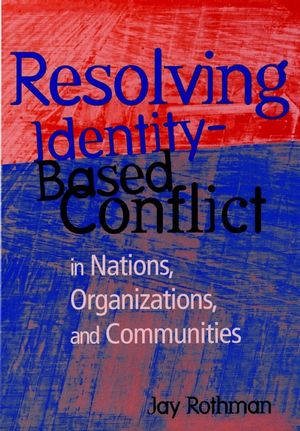Resolving Identity-Based Conflict In Nations, Organizations, and CommunitiesISBN: 978-0-7879-0996-3
Hardcover
224 pages
July 1997, Jossey-Bass
 This is a Print-on-Demand title. It will be printed specifically to fill your order. Please allow an additional 15-20 days delivery time. The book is not returnable.
|
||||||
"Absolutely essential reading for anyone interested in identity
conflicts and how to overcome them. Provides a fascinating
theoretical introduction to the phenomena, detailed case study
experiences, and a final training guide for practitioners...a
landmark work." (Kevin Clements, Vernon and Minnie Lynch Professor
of Conflict Resolution, and director, Institute for Conflict
Analysis and Resolution, George Mason University)
"Jay Rothman not only says it is possible to bring about reconciliation of communities, organizations, and nations involved in long-standing, deeply rooted conflicts, but he shows just how to do it! . . . Focusing on the importance of social identity and the steps involved in transforming antagonism into effective joint action, he helps us go beyond the role of interests to a more complete understanding of needs and their importance in conflict resolution." (Lawrence Susskind, director, MIT-Harvard Public Disputes Program, and president, Consensus Building Institute)
"With clarity and imagination, Jay Rothman explores identity conflict from the community to the international arena. . . . This book provides direction and hope for all those engaged in the essential work of conflict resolution." (Richard Deats, editor of Fellowship, the magazine of the Fellowship of Reconciliation)
"Re-imagines conflict mediation in a remarkably new way--by bringing together the empirical language of negotiation with the pattern-recognition skills of the artist, a new and exciting synthesis is possible." (Michael Jones, pianist, composer, Narada recording artist, and author of Creating an Imaginative Life)
?The ARIA framework works at many levels. It is a wonderful metaphor for the phases of constructive conflict resolution that has applications in so many fields. It is the analytic melody that connects the phases through the example of a string quartet, and it captures how creative conflict resolution is like a beautiful song when expertly executed. In all its forms, I have incorporated ARIA into my teaching and practice.? (Deborah M. Kolb, professor of negotiation and conflict resolution, Simmons College; Senior Fellow, Program on Negotiation at Harvard Law School)
"Jay Rothman not only says it is possible to bring about reconciliation of communities, organizations, and nations involved in long-standing, deeply rooted conflicts, but he shows just how to do it! . . . Focusing on the importance of social identity and the steps involved in transforming antagonism into effective joint action, he helps us go beyond the role of interests to a more complete understanding of needs and their importance in conflict resolution." (Lawrence Susskind, director, MIT-Harvard Public Disputes Program, and president, Consensus Building Institute)
"With clarity and imagination, Jay Rothman explores identity conflict from the community to the international arena. . . . This book provides direction and hope for all those engaged in the essential work of conflict resolution." (Richard Deats, editor of Fellowship, the magazine of the Fellowship of Reconciliation)
"Re-imagines conflict mediation in a remarkably new way--by bringing together the empirical language of negotiation with the pattern-recognition skills of the artist, a new and exciting synthesis is possible." (Michael Jones, pianist, composer, Narada recording artist, and author of Creating an Imaginative Life)
?The ARIA framework works at many levels. It is a wonderful metaphor for the phases of constructive conflict resolution that has applications in so many fields. It is the analytic melody that connects the phases through the example of a string quartet, and it captures how creative conflict resolution is like a beautiful song when expertly executed. In all its forms, I have incorporated ARIA into my teaching and practice.? (Deborah M. Kolb, professor of negotiation and conflict resolution, Simmons College; Senior Fellow, Program on Negotiation at Harvard Law School)



